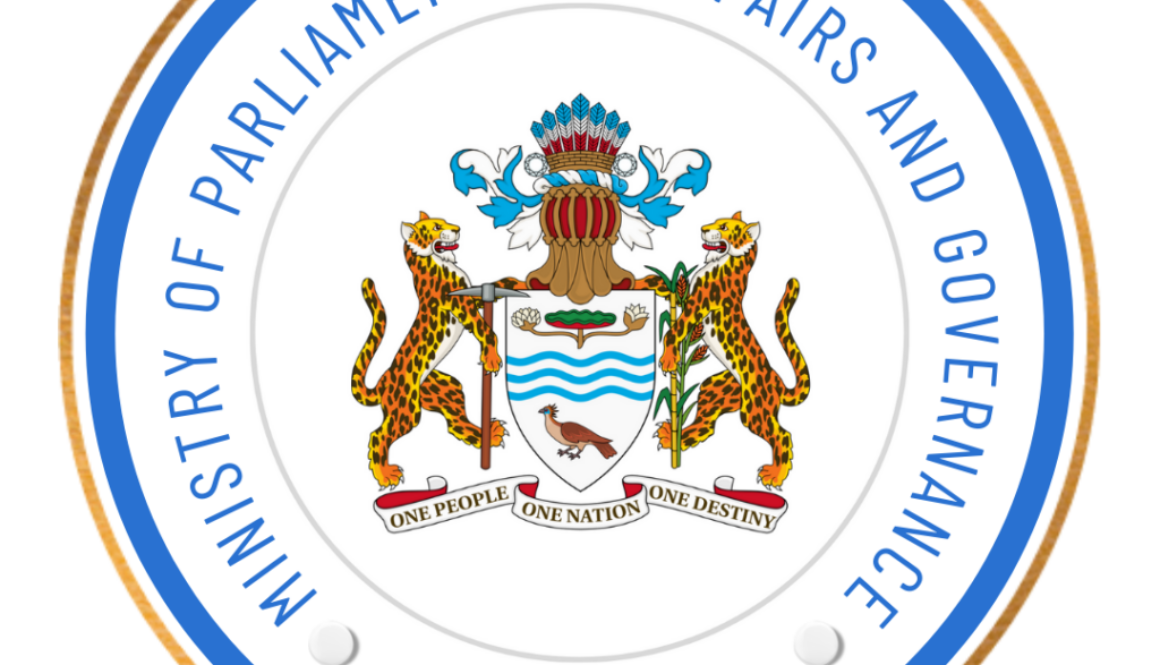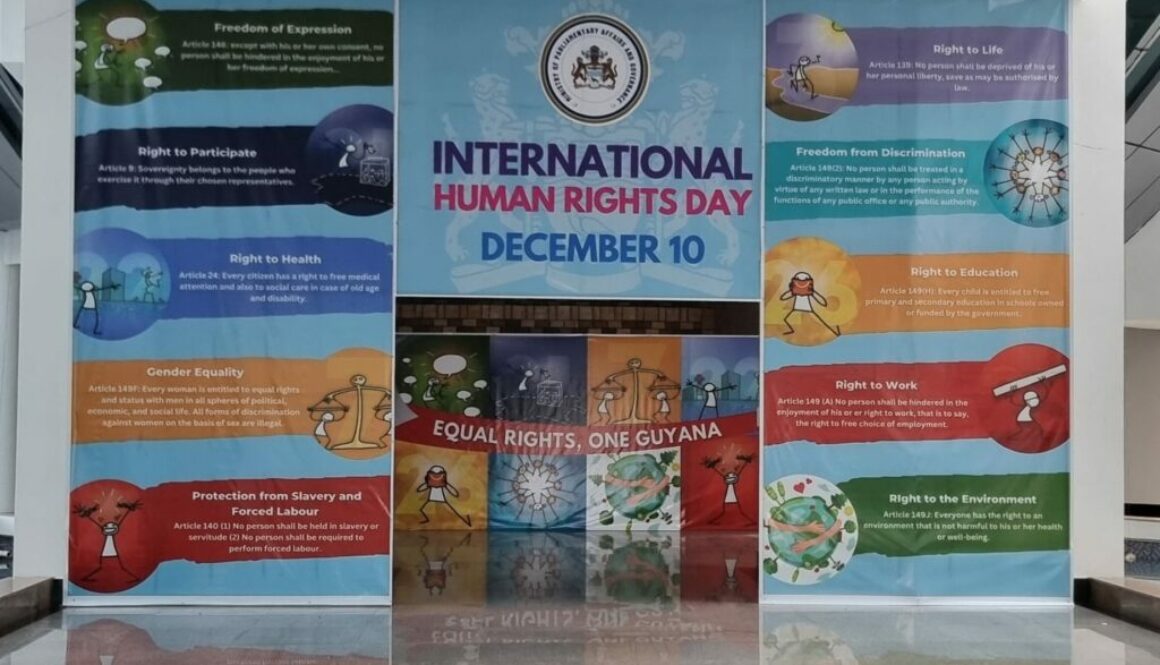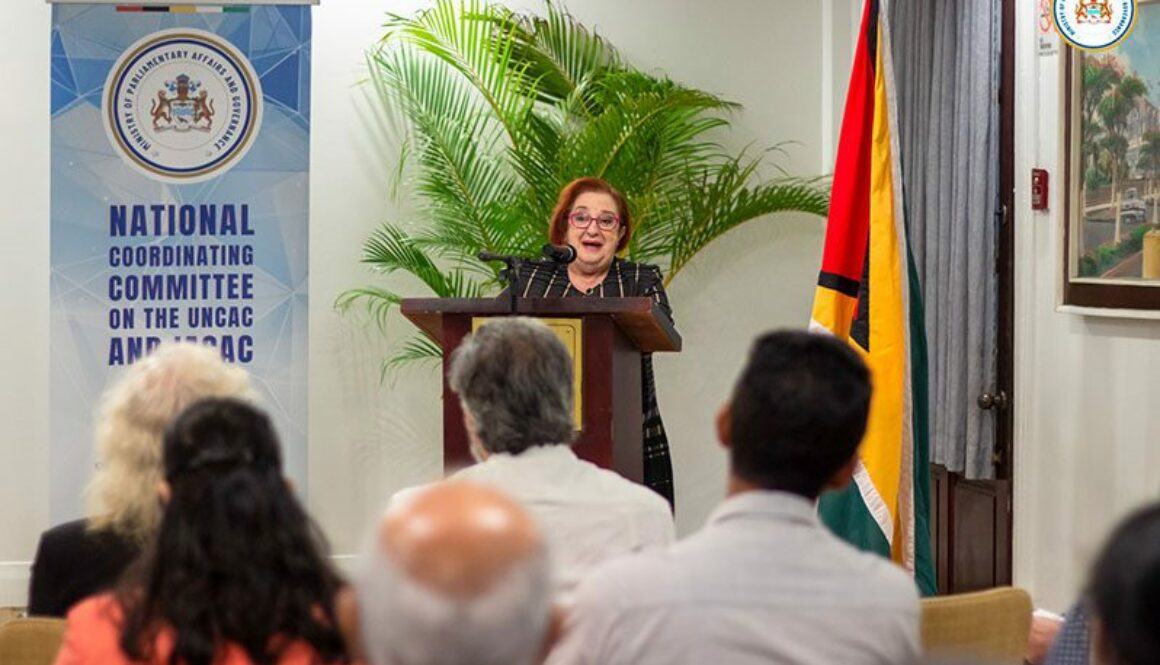
Anti Corrupton


WATCH || Ministry of Parliamentary Affairs and Governance’s Human Rights Expo Opening Panel Discussion
The Global Human Rights Landscape

HUMAN RIGHTS DAY 2022




Guyana joins observation of International Anti-Corruption Day
On December 9, 2022, Guyana joins with 187 member states to the UN Convention against Corruption to observe International Anti-Corruption Day.
As stated by the United Nations, “the 2022 International Anti-Corruption Day (IACD) seeks to highlight the crucial link between anti-corruption and peace, security, and development. At its core is the notion that tackling this crime is the right and responsibility of everyone, and that only through cooperation and the involvement of each and every person and institution can we overcome the negative impact of this crime. States, government officials, civil servants, law enforcement officers, media representatives, the private sector, civil society, academia, the public and youth alike all have a role to play in uniting the world against corruption.”
It is globally recognized that corruption is a complex social, political and economic phenomenon that affects all countries. Most importantly, it is also recognized that corruption undermines the foundation of democratic institutions by distorting electoral processes, perverting the rule of law and creating bureaucratic quagmires whose only reason for existing is the soliciting of bribes. Economic development is stymied as valuable resources for the development of the countries are squandered to the detriment of those who are the most poor and vulnerable. Corruption contributes to governmental instability and is therefore a major obstacle to development. It infects education, health, justice, democracy, and prosperity. And it is one of the biggest impediments to achieving the Sustainable Development Goals (SDGs).
The Preamble to the UN Convention Against Corruption declares that “the States Parties to this Convention are:
Concerned about the seriousness of problems and threats posed by corruption to the stability and security of societies, undermining the institutions and values of democracy, ethical values and justice and jeopardizing sustainable development and the rule of law,
Concerned also about the links between corruption and other forms of crime, in particular organized crime and economic crime, including money- laundering, and
Concerned further about cases of corruption that involve vast quantities of assets, which may constitute a substantial proportion of the resources of States, and that threaten the political stability and sustainable development of those States.”
Guyana ratified the UN Convention Against Corruption on April 16, 2008, and the InterAmerican Convention Against Corruption, the first treaty of this nature, on December 11, 2000.
The Government of Guyana remains committed to not only upholding the constitution, democracy, and human rights, but also to strengthening the mechanisms and measures necessary for greater transparency and accountability, inclusion, and participation. The Government believes that one of the most effective pillars in the fight against corruption is openness, transparency, and accountability.
Further, the Government of Guyana has taken several steps to enhance transparency and accountability as critical to good governance of the state, to prevent and combat corruption at all levels of public administration, and to have multi-agency coordinated anti-corruption policies/practices.
Guyana’s anti-corruption framework and policies are implemented through Constitutional Bodies, Statutory Bodies, and Parliamentary Oversight Bodies.
There are Constitutional provisions that protect the independence of constitutional post-holders and constitutional bodies from interference. Guyana also has ongoing legislative reform that provides for greater transparency and accountability to prevent, detect, and prosecute acts of corruption, and there is oversight of government at the national, regional, and international levels with the anti-corruption conventions Guyana has ratified.
There are a total of 16 constitutional bodies established by the constitution with specific responsibilities across key sectors, including human rights and anti-corruption. These Constitutional Bodies enjoy independence in the execution of their mandates and are not subject to programmatic interference by any arm of government. The annual recurrent and capital budgets of these agencies are direct charges on the Consolidated Fund in keeping with constitutional provisions and these sums are therefore examined and approved by the National Assembly.
Those who play a role in the anti-corruption framework are:
- Constitutional Bodies
- The Office of the Auditor General
- The 3 Service Commissions – Judicial, Public and Police
- The Ombudsman
- The Supreme Court
- The Office of the Director of Public Prosecutions (DPP)
- The Public Procurement Commission (PPC)
- The Public Service Appellate Tribunal (PSAT)
Statutory Bodies
- The National Procurement and Tender Administration Board (NPTAB) (Procurement Act)
- The Integrity Commission (IC)
- The Financial Intelligence Unit (FIU)
- The Special Organized Crime Unit (SOCU) of the Guyana Police Force
- The Guyana Revenue Authority (GRA)
- The Securities Council
- The Commissioner of Information
- The Bank of Guyana
- The Police Complaints’ Authority (PCA)
Parliamentary Oversight Bodies
The parliamentary Public Accounts Committee (PAC) oversees the government’s expenditure of funds whilst the parliamentary Sectoral Committees on Foreign Relations, Social Services, Economic Services, and Natural Resources oversee government policies, programmes and performance.
The Parliamentary Standing Committee of Appointments (COA) through an agreed-upon consensual mechanism is responsible for the nomination of members to several constitutional bodies in compliance with the Constitution of Guyana, as well as the recruitment and appointment of the top three positions of the Financial Intelligence Unit in accordance with the Anti-Money Laundering and Countering the Financing of Terrorism Act. The COA also nominates the Board of the Natural Resource Fund and its Public Oversight and Accountability Committee.
The appointment of the Commissioners to the Integrity Commission and the Public Procurement Commission was achieved in 2023 and both bodies are functioning.
In a direct effort to enhance transparency and ensure the public are well informed the Government has upgraded many government websites, while at the same time uses traditional and social media, such as Facebook and Twitter, to reach as many people as possible.
The Government of Guyana through the Ministry of Parliamentary Affairs and Governance established, in June 2021, a National Coordinating Committee (NCC) on the implementation of the United Nations Convention Against Corruption (UNCAC) and the Inter-American Convention Against Corruption (IACAC). Currently sixteen (16) agencies are represented on the Committee. The NCC enhances institutional and systematic inter-agency collaboration and builds capacities within the anti-corruption framework of Guyana.
The first Guyana Anti- Corruption Framework document was published in June 2022 by the Ministry of Parliamentary Affairs and Governance. This publication is user friendly and simple to understand.
The National Coordinating Committee organised two training workshops on anti-corruption measures in Guyana. The first anti-corruption workshop was held on June 25, 2022, and the second was held on August 30-31, 2022. These workshops focused on sensitizing participants from the Government, private sector, and civil society on the critical need to uphold the key pillars of transparency and accountability relative to their sectors.
Guyana is a member of and participated in the 8th Annual Conference of the Commonwealth Caribbean Association of Integrity Commissions and Anti-Corruption Bodies (CCAICACB) held in May 2022 in St. Kitts. Notably, Guyana will be hosting the 9th annual Conference of this body in 2023.
The Guyana Parliament, through the Public Accounts Committee is also now a member of the Commonwealth Association of Public Accounts.
As a member state to the Mechanism for the Oversight of the Implementation of the InterAmerican Convention against Corruption Guyana will be preparing for its 6th Cycle of Review in 2023 as it shall also be preparing for the in situ visit of the UNCAC assessors of its Second Self-Assessment in 2023.
Guyana also reported and was reviewed by CFATF/FATF and the Extractive Industry Transparency Institute.
In its September 2022 Article IV Report, the IMF stated that the recent amendments to the Natural Resource Fund (NRF) Act set clear ceilings on withdrawals from the fund for budgetary spending and promotes transparency in the management and use of oil resources with parliamentary approval. The authorities in Guyana were praised for the thorough review of the new NRF Act before making amendments and the restraint in using any oil revenues before the passage of this statute.
In addition, Guyana is now qualified to join the Egmont group following the passage of the August 2022 Anti-Money Laundering and Countering the Financing of Terrorism (Amendment) Act. This will now allow the Financial Intelligence Unit to collaborate with other FIUs globally in combatting money laundering and the financing of terrorism.
Not only has there been a strengthening of anti-corruption measures, noteworthy are the number of cases before the courts for corruption of state assets by former government officials and functionaries, including electoral conspiracy and fraud, as well as bribery and other acts of corruption.
Despite many challenges of timely data collection, investigative and prosecutorial capacities and timely judicial decisions, Guyana has and continues to made progress in its fight against corruption.
Guyana undoubtedly has developed over the last 19 years a robust Anti-Corruption Framework. The implementation of the framework through the work of the Constitutional, Statutory and Parliamentary Oversight bodies contribute to building greater awareness of acts of corruption and enhancing public trust and confidence in these institutions to carry out their mandates effectively, professionally, and efficiently. The Government remains fully committed to promoting transparency and strengthening institutions in the continuous implementation of its anti-corruption framework consistent with its treaty obligations under the UN Convention Against Corruption and the Inter-American Convention against Corruption.

Greater transparency, accountability achieved
–through consistent efforts to fortify Guyana’s anti-corruption framework, policies
SIGNIFICANT progress has been made over the past two years to fortify Guyana’s anti-corruption framework and policies, thereby fostering greater transparency and accountability, Minister of Parliamentary Affairs and Governance Gail Teixeira has said.
Minister Teixeira outlined the government’s achievements and plans in her statement commemorating World International Anti-Corruption Day, which is being observed under the theme, “Promoting Transparency and Strengthening Institutions”.
She related that Guyana’s anti-corruption framework and policies are implemented through constitutional, statutory and parliamentary oversight bodies.
The minister affirmed, too, that there are constitutional provisions that protect the independence of the constitutional post-holders and bodies from interference.
That said, she added: “Guyana also has ongoing legislative reform that provides for greater transparency and accountability to prevent, detect and prosecute acts of corruption, and there is oversight of government at the national, regional and international levels with the anti-corruption conventions Guyana has ratified.”
Guyana, Minister Teixeira said, has a total of 16 constitutional bodies with specific responsibilities across key sectors, including human rights and anti-corruption, which all enjoy independence in the execution of their mandates.
In an effort to enhance transparency, and ensure that the public is well informed, the government has also upgraded many government websites.
Further, the government, through the Ministry of Parliamentary Affairs and Governance, established a National Coordinating Committee (NCC) on the implementation of the United Nations Convention Against Corruption (UNCAC), and the Inter-American Convention Against Corruption (IACAC).
Some 16 agencies are represented on the committee, which enhances institutional and systematic inter-agency collaboration, and builds capacity within the anti-corruption framework of the country.
Guyana ratified the UN Convention Against Corruption on April 16, 2008, and the Inter-American Convention Against Corruption, the first treaty of this nature, on December 11, 2000.
The country’s seriousness is demonstrated by its anti-corruption framework document, which was published on June 20 by the ministry. Since its formation, the NCC has organised two training workshops on anti-corruption measures in the country, and those focused on sensitising participants from the government, private sector and civil society on the need to uphold the key pillars of transparency and accountability in relation to their sectors.
It is evidenced by the many initiatives that the Government of Guyana remains committed to not only upholding the constitution, democracy, and human rights, but also to strengthening the mechanisms and measures necessary for greater transparency and accountability, inclusion, and participation.
Guyana was praised in the September 2022 Article IV report of the International Monetary Fund (IMF) for the recent amendments to the Natural Resource Fund (NRF) Act.
“Not only has there been a strengthening of anti-corruption measures, noteworthy are the number of cases before the courts for corruption of state assets by former government officials and functionaries, including electoral conspiracy and fraud, as well as bribery and other acts of corruption,” Minister Teixeira said.
Despite challenges of timely data collection, investigative and prosecutorial capacities and timely judicial decisions, Guyana continues to make progress in its fight against corruption.
Taken from The Guyana Chronicle
